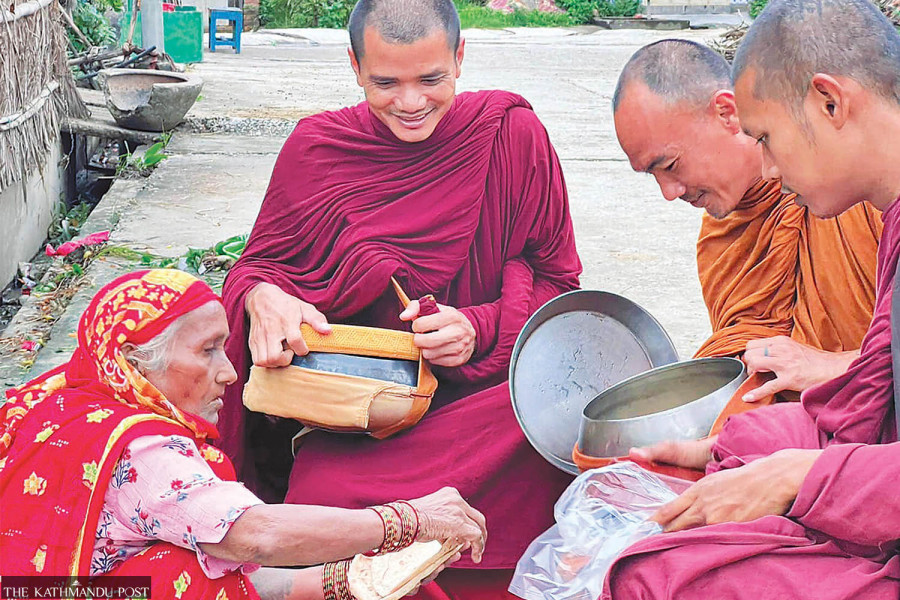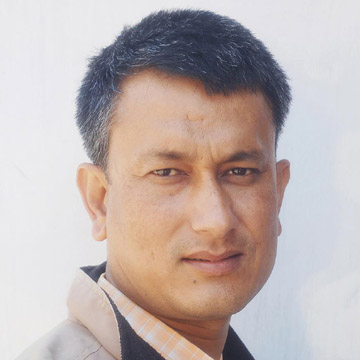Lumbini Province
Thai monks on rainy-season spiritual retreat in Lumbini
17 monks from various provinces in Thailand are on a three-month Varshavasa in Buddha’s birthplace, dedicating their time to meditation and preaching.
Manoj Paudel
Thai monk Dantachitta begins his day at 7 am in Lumbini, the birthplace of Gautam Buddha, with a begging bowl, collecting alms from local villages. From Khon Kaen Province in Thailand, he and his fellow monks gather rice and vegetables during their rounds, which they cook and share together.
The ten monks accompanying him sustain themselves with these offerings until noon, after which they focus on preaching. Currently, 17 monks from five different provinces of Thailand are spending three months in Lumbini for Varshavasa, a monastic practice during the rainy season.
The practice started on Ashad Purnima, the second most significant Buddhist festival. Monks and novices observe it in Lumbini and surrounding districts including Kapilvastu and Nawalparasi West.
In Buddhism, Varshavasa lasts from Ashad Purnima to Ashoj Purnima. During this period, monks, nuns, and novices stay in one place to avoid harming living beings and to atone for any inadvertent mistakes.
During this time, monks meditate, recite chants, and share Buddhist teachings with local communities. They typically eat one meal a day, mostly relying on alms from the locals.
“I’ve come to Lumbini, the birthplace of Buddha, for this practice,” said Phramaha Kridtin Tarapon, a monk from Chiang Mai, Thailand. “It’s a great opportunity for spiritual development, and I look forward to sharing the goodwill and compassion I've gained here when I return to Thailand.”
A total of 40 monks from Thailand, Myanmar, Sri Lanka, and Nepal are participating in the rainy season practice in Lumbini.
Seven Thai monks are observing at the Royal Thai Monastery, while ten are at Shakyamuni Vihar. Additionally, two monks from other countries are at Myanmar Golden Temple, one at Sri Lanka Vihar, and two at the Mahabodhi Society.

Likewise Navmaitri Mahavihar hosts three monks, the International Buddhist Society three; and Tilaurakot, Nigrodharam and Ramgram in Nawalparasi are hosting four Thai monks each.
According to monk Shree Vajira, an associate professor at Lumbini Buddhist University, the rules of this rainy season practice are detailed in chapters 3 and 4 of Mahavagga Pali of the Vinaya Pitaka. This tradition dates back to Buddha’s time, and involves monks staying in one place and avoiding nonessential travel. This practice is considered a special rule within Buddhism.
Historically, the practice was started due to the difficulties faced by monks travelling during the rainy season, such as damaging crops and encountering insects. During this time, monks focus on preaching to local communities, imparting meditation techniques, and emphasising the importance of charity.
According to Monk Maitri Mahathera, this practice brings about profound positive changes in both individuals and society, fostering discipline, virtue, and good conduct. It promotes harmony and compassion.
During the rainy season practice, monks stay in one monastery or temple for three months, dedicating themselves to study and contemplation. They generally are not allowed to leave except for special reasons, and even then, only for up to a week. According to Maitri Mahathera, staying away longer is considered breaking the practice.
Some monks and novices observe the rainy season practice at the request of upāsaka, lay devotees who extend the invitation. During this time, devotees typically provide necessary items such as orange/saffron robes, food, bedding, and medicinal supplies.
After the three-month period, the upāsaka return to present new robes to the monks and participate in ceremonies marking the end of the practice, celebrated as a special festival. This tradition allows both the monks and the upāsaka to accumulate merit and celebrate the completion of the retreat.
Thai monks make significant efforts to visit Lumbini for the retreat. This year, 17 monks have come. Lumbini provides a unique opportunity for accruing important spiritual merit, which is why they eagerly make the journey,” said Fara Bodhiwets, head monk of the Thai Monastery in Lumbini.




 5.12°C Kathmandu
5.12°C Kathmandu












